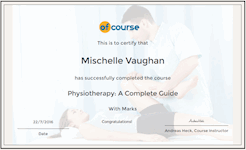Physiotherapy: A Complete Guide
OfCourse
Summary
- Certificate of completion - Free
- Tutor is available to students
Overview
If you’re currently a physiotherapy student or just have a passing interest, this course can help you improve on your fundamentals and advance your skills as a physiotherapist. It uses in-depth video tutorials to guide you all the way, constantly referring back to the latest research and science so you know your skills are up to date.
Course media
Description
Course Highlights
- Learn physiotherapy techniques with 3 hours of fantastic online video tutorials and multiple PDFs
- Quizzes to check that you are on the right lines with the course.
- Improve your knowledge of the body and potential problems from your own home
- Learn about everything from diagnosis to Special Testing and Joint Play
- Improve your performance in physiotherapy exams
Course Overview
This course offers a fantastic way to learn physiotherapy, right from anatomy instruction, to diagnosis tutorials and through to special testing and joint play of different parts of the body
By taking this course you will have the necessary skills to perform basic physiotherapy techniques on friends, family and clients. You will have the ability to successfully diagnose injuries to the body and perform appropriate practises on your patient.
Couse Curriculum
Introduction & Patient History Taking
- Intro
- Say hi and tell your fellow students why you're taking this course
- Share your new course with your friends!
- Introduction & Patient History
- Patient History & RPS Form
- Task 1
- RPS Form
Observation & Functional Assessment
- Handout - Posture analysis
- Posture Analysis
- Handout - Functional Assessment
- Functional Assessment
- Task 2
- Jacky Brown RPS from Week 1
Gait Assessment, Active & Passive Range of Movement, Resisted Isometric Testing
- Handout - Gait Assessment
- Gait Cycle & Gait Analysis
- AROM & PROM
- Task 3
- Gait Analysis Nijmegen
Basic Assessment of the Hip
- Introduction to AROM Hip
- Active Range of Motion: Hip
- PROM Hip
- Passive Range of Motion: Hip
- Resisted Isometric Testing: Hip
- Task 4
- RPS Form
Special Tests for Muscle Tightness Around the Hip Joint
- Bent Knee Stretch Test
- Back Saver Sit-and-Reach Test
- 90-90 Straight Leg Raise Test
- Piriformis Test
- Ober's Test
- Rectus Femoris Contracture Test
- Thomas Test
- Ely's Test
Basic Assessment of the Knee
- AROM Knee
- Active Range of Motion: Knee Joint
- Passive Range of Motion: Knee Joint
- Resisted Isometric Testing: Knee Joint
- Brush/Stroke/Swipe/Bulge Test
- Patellar Test
- Notes for the Brush & Pattelar Test
- Task 5
Basic Assessment of the Lower Leg, Ankle & Foot
- AROM Ankle
- Active Range of Motion: Ankle
- PROM Ankle
- Passive Range of Motion: Ankle
- Resisted Isometric Testing: Ankle
- Task 6
Introduction to Special Testing & Joint Play
- Introduction to Special Testing & Joint Play
- Sensitivity and Specificity Explained
- Task 7
Joint Play & Special Testing: Hip
- Handout - Joint Play Hip
- Joint Play: Hip
- Special Testing
- Anterior Labral Tear Test
- Posterior Labral Tear Test
- Trendelenberg Test
- Patrick's/Faber/Figure Four Test
- Sign of the Buttock
- Weber-Barstow Manoeuvre
Joint Play & Special Testing: Knee
- Joint Play: Knee
- Special Testing
- Apley's Test
- McMurray Test
- Thessaly Test
- Pivot Shift Test
- Lachman Test
- Anterior Drawer Test
- Posterior Drawer Test
- Valgus Stress Test
- Varus Stress Test
- Task 8
Joint Play & Special Testing: Ankle
- Handout - Joint Play Ankle
- Joint Play: Ankle
- Anterior Drawer Test
- Talar Tilt
- Tinel's Sign
- Thompson Test
Basic Testing of the Shoulder
- Active Range of Motion: Shoulder
- Passive Range of Motion: Shoulder
- Resisted Isometric Testing: Shoulder
- Apley Scratch Test
- Handout - Apley Scracth Test
- task 9
Special Testing & Joint Play: Shoulder
- Handout - Shoulder Impingement Explained
- Shoulder Impingement Explained
- Joint Play: Shoulder
- Lift Off Sign
- Lateral Rotation Lag Sign
- Latissimus Dorsi Strength Test
- Serratus Anterior Strength Test
- Rhomboid Strength Test
- Bicep Tightness Assessment
- Tricep Tightness Assessment
- Pectoralis Tightness Test
Basic Testing of the Elbow
- Active Range of Motion: Elbow
- Passive Range of Motion: Elbow
- Resisted Isometric Testing: Elbow
- Task 10
Joint Play & Special Testing: Elbow
- Handout - Joint Play Elbow
- Joint Play: Elbow
- Mill's Test
- Lateral Epicondylitis Test
- Medial Epicondylitis Test
- Valgus Instability Stress Test
- Varus Instability Stress Test
Basic Testing of the Forearm, Wrist & Hand
- Active Range of Motion: Wrist & Hand
- Passive Range of Motion: Wrist & Hand
- Resisted Isometric Testing: Wrist & Hand
- Task 11
Joint Play & Special Testing: Forearm, Wrist & Hand
- Joint Play & Special Testing: Forearm, Wrist & Hand
- Joint Play: Wrist
- Joint Play: Wrist & Hand
- Phalen Test
- Tinel Sign
- Finkelstein Test
- Allen Test
- Digital Blood Flow Test
Quiz
- Part 1
- Part 2
Why Choose OfCourse Learning?
- All courses are taught by verified experts
- Students enjoy 24/7 access to their courses
- Courses can be accessed on any device
- Students get lifetime access to their courses so they can work at their own pace
- On completion, students receive a course certificate from a recognised educational institution
- Become a part of a global learning community where you can talk with teachers and students about the course
Who is this course for?
- Students of physiotherapy
- Current practitioners looking to improve their skills or update their knowledge.
Requirements
There are no prerequisites for this course
Career path
Become a physiotherapist
Certificates
Certificate of completion
Digital certificate - Included
Reviews
Currently there are no reviews for this course. Be the first to leave a review.
Legal information
This course is advertised on reed.co.uk by the Course Provider, whose terms and conditions apply. Purchases are made directly from the Course Provider, and as such, content and materials are supplied by the Course Provider directly. Reed is acting as agent and not reseller in relation to this course. Reed's only responsibility is to facilitate your payment for the course. It is your responsibility to review and agree to the Course Provider's terms and conditions and satisfy yourself as to the suitability of the course you intend to purchase. Reed will not have any responsibility for the content of the course and/or associated materials.



